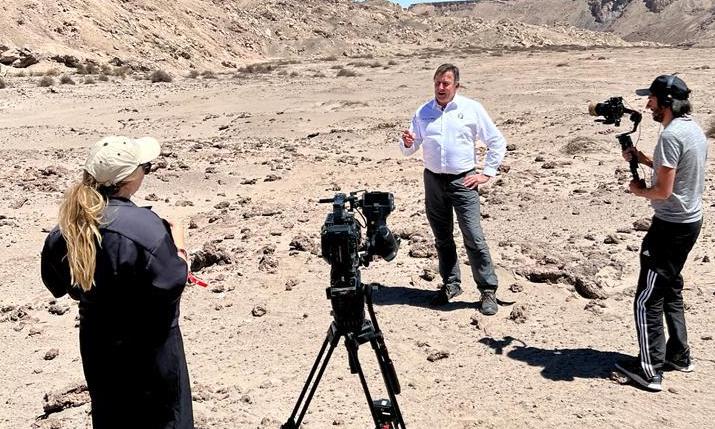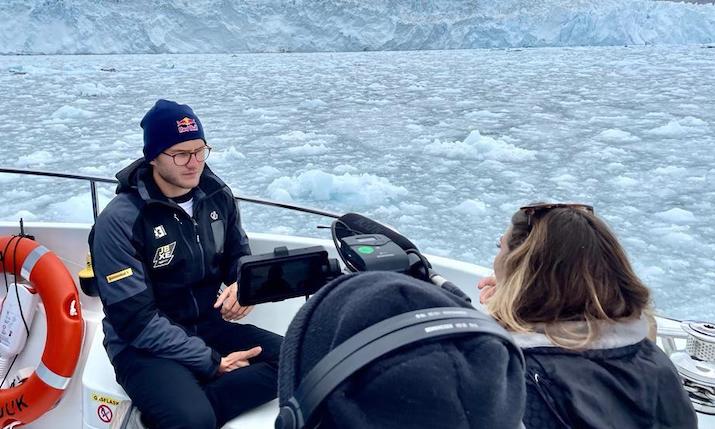Demand respect: Aurora producer Megan Alldridge on succeeding in a male-dominated industry

Interviewing Professor Carlos Duarte, who forms part of Extreme E’s Scientific Committee, in the Atacama Desert, Chile during Extreme E season 2
The pathway from studying ancient history at university to producing coverage of electric motorsport may not be immediately obvious, but for Aurora producer, Megan Alldridge, the connection is rooted in narratives, with her studies sowing the seeds for a love of storytelling.
“I got into TV broadcasting in a very roundabout way,” she says. “After university I was working in corporate events and was asked to make a video summing up the conference I was running. I loved telling the story through video so much that I decided to pursue a career in broadcast journalism.
After a stint at the Daily Mail she moved to CNN and an internship in the features team. “Taking an internship at the age of 25 felt like a back step at times, but it was the best thing I ever did,” she says. “I got so much experience as an associate producer there and worked with some of the finest talent in the world.”
Supercharged for motorsports
While at CNN, a colleague who worked on Supercharged, a CNN programme about Formula E, introduced Alldridge to Formula E production company Aurora. Keen to take on a new challenge, she leapt at the opportunity to join Aurora as an assistant producer.
“I just love the stories that come out of sport – it’s not just about what happens out on the track, it’s about the personalities, the egos and the human element of it,” she says. “Sport also shines a spotlight on important issues such as the environment, on equality, on diversity, and I think the role it plays is vital to society – it’s so much more than just entertainment and I love to spread this message whenever I can.”
Since joining Aurora as an AP she has progressed to the role of producer, in a role that has provided plenty of opportunities for working on cutting-edge productions.
“I work on Extreme E and the level of production that we’re able to pull off remotely (we do it all from London despite races taking place in the middle of deserts and on glaciers) is one of the biggest steps forward for the industry. It shows that you can keep your footprint down despite being a global motorsport. It also shows where teamwork can get you.”
“The secret is not to try too hard to be liked. People respect you for standing your ground, so always be nice, but demand respect and you will get it”
And when not working remotely, Alldridge has taken in some far-flung locations. “I’ve been to the Amazon Rainforest and walked on glaciers in the middle of Greenland; it’s all in a day’s work. Sometimes you pinch yourself that you’re able to do a job which isn’t just sitting at a desk.”
Along with the travel, the thrill of seeing the finished product ranks highly as one of the rewards of working in production. “It’s always so satisfying, to know how much effort it took and to know that it was all worth it when you see it come together on screen. The camaraderie of everyone working together is also unlike anything I’ve ever experienced in any other industries; it is incredible.”
Fast-paced industry
However, working in a fast-paced industry is not without its challenges and demands quick thinking and speedy decision making. “The job is extremely rewarding but it can at times be extremely trying. The hours are never 9 to 5, and the travel can feel like a lot. There are constant curveballs and things that go wrong no matter how much you’ve prepared,” she says.
And, there is the added challenge of being a woman. “By nature, it is very male-dominated so it can feel at times like you’re having to prove your worth that much more,” she says.

interviewing Extreme E driver Kevin Hansen about his experience of going back to Greenland for season two and what it’s like to race for a championship that puts climate at its heart
The hardest part, she adds, is not being taken seriously, especially as a young woman. “Your judgement is usually questioned in a way that it wouldn’t be for my male counterparts, and you have to go that much further to prove your worth. I’ve learnt to make sure that I’m not silenced, I have had to actively make an effort to be seen and heard. I’ve had to get a lot tougher in this job and the secret is not to try too hard to be liked. People respect you for standing your ground – always be nice, but demand respect and you will get it.”
Despite this, for anyone considering a role in sport, her advice is simple: “Do it! Sports broadcasting needs more women – especially young women – so network, reach out to companies, even find a mentor who can help you. It’s such a rewarding job and more women in the industry is exactly what it needs.”

